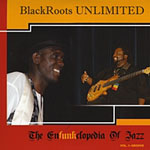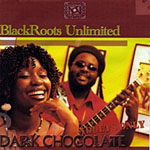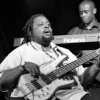Home » Jazz Articles » Interview » Tshaka Mayanja: Chasing His Jazz Dream
Tshaka Mayanja: Chasing His Jazz Dream
Commercial success doing this kind of music in Uganda, let alone anywhere else in the world, is still a dream.
 'Jazz' and 'Uganda' are rarely used in the same sentence. This little country in East Africa does not have much of a jazz tradition to speak of, let alone write about. Aside from international artists, the likes of Miriam Makeba and Hugh Masekela, as well as specially arranged cultural exchanges by the American, German and Dutch embassies, there has been, until recently, little to speak of locally.
'Jazz' and 'Uganda' are rarely used in the same sentence. This little country in East Africa does not have much of a jazz tradition to speak of, let alone write about. Aside from international artists, the likes of Miriam Makeba and Hugh Masekela, as well as specially arranged cultural exchanges by the American, German and Dutch embassies, there has been, until recently, little to speak of locally.All that is starting to change, for a variety of reasons. Somewhere in the thick of things is Tshaka Mayanja, who has staked his musical reputation on finding and thrusting some fine local artists into the spotlight. Mayanja has led a varied career, starting off as a bona fide reggae artist in Uganda, at a time when local music was not getting much airplay and recording facilities were hard to come by. He later moved to the United Kingdom, where he spent several years before returning to Uganda in 2004 to find great changes in the local music industry.
All About Jazz: Tell us a little about yourself. How would you describe yourself as a musician? How would you describe your music?
Tshaka Mayanja: I just turned 36 this year. I am a music fanatic. Obsessed, in fact. I have been writing songs for 20 years now, predominantly reggae music. I started writing "jazzy" pieces while in the UK a few years ago. Since then, I am a jazz music buff. To that add, funk, soul and the blues. I have hours and hours of jazz, soul and funk musicians' bios [and] live concerts.
My music is an amalgamation of all the above genres that inspire me, with the foundation being Roots and Lovers Rock reggae music.
AAJ: Your first two albums were steeped more heavily in reggae, and the latter two skewed toward jazz funk. Was this a conscious decision?
TM: I am reggae through and through. But, as earlier stated, I am actually a child of soul, funk, disco, the blues, bossa nova, Latin jazz and country. I grew up on all these genres. My parents owned a huge collection of vinyl LPs. It was such an eclectic mix of genres. Reggae and jazz came into my life at a later stage.
It was a conscious decision for me to do these albums in the different genres that shape me. I only started playing the bass in 2002. Playing and experimenting with these genres is fun. I also wanted to showcase my versatility as a musician and songwriter.
AAJ: What is BlackRoots UNLIMITED, the moniker under which you release your music? What does it symbolize?
TM: My music is 'Rooted in Blackness.' All the music I release has its roots in Africa. It symbolizes that both the heights and depths at which this music can go are unlimited.
 AAJ: The songs titles themselves are quite interesting. Tell us about your creative process. How do the name ideas come up? Do you not worry that the song titles might not resonate locally with Ugandans? Do you think your music is relevant to the Ugandan audience?
AAJ: The songs titles themselves are quite interesting. Tell us about your creative process. How do the name ideas come up? Do you not worry that the song titles might not resonate locally with Ugandans? Do you think your music is relevant to the Ugandan audience?
TM: The creative process is spiritual. I cannot sit purposely to start writing a song. I'll fail. Music just comes naturally to me. I am very good with words, I can write a song literally about anything, in a flash. I am also good with melody creation. The recent albums with Pragmo [Nsaiga, featured on BRU's latest two albums] were a joint process.
As for the names, I cannot explain how they come about. I am not really concerned, never have been, as to whether the titles resonate with the Ugandan audience. I don't think my music is relevant to the majority of the Ugandan audience. It doesn't bother me anymore. I do have a following and for now, that will do. This music will one day be in the mainstream again in these parts, and history will show that I started it all. I did the same for reggae music [in Uganda] 15 years ago. At that time, nobody would touch it at all.
AAJ: You are obviously marketing yourself to a much wider audience than in Uganda; how does the response compare locally and internationally?
TM: The response outside Uganda has been tremendous. Even in Uganda, there is a section of music lovers who have supported these projects very much.
AAJ: Was it a conscious decision to base yourself back in Uganda? Does that help or hinder what you are trying to achieve?
TM: It does hinder creativity a bit, since there aren't many musicians here, if at all, with whom we share this vision. It does become frustrating. However, I am on the internet daily, communicating with inspirational artists and people with like minds all over the world.
Funnily enough, I do not think I would have been able to record and release these projects had I stayed in the UK. There's way too much stress [in the UK], and being given a chance is next to impossible. Here, I can take my time, and still be able to release the music worldwide without leaving home.
AAJ: Tell us a little about the people you have show cased—Angela Kalule and Pragmo N'Saiga—why them? The partnership with Pragmo has produced two albums in quick succession, is this long term partnership musically?
 TM: Angela Kalule, who I 'baptised' K'Angie Mtume, is a very talented vocalist. When I came [back] to Uganda in 2004, she was a very frustrated artist who felt there was no light at the end of the tunnel. She wanted to sing jazz, and to sing in English, yet her peers discouraged her. I wrote, produced and played an album called Dark Chocolate (Blackroots Muzik, 2005) for her, so as to showcase her singing. As I write, she is now the most sought after female singer and MC's at all Ugandan corporate events.
TM: Angela Kalule, who I 'baptised' K'Angie Mtume, is a very talented vocalist. When I came [back] to Uganda in 2004, she was a very frustrated artist who felt there was no light at the end of the tunnel. She wanted to sing jazz, and to sing in English, yet her peers discouraged her. I wrote, produced and played an album called Dark Chocolate (Blackroots Muzik, 2005) for her, so as to showcase her singing. As I write, she is now the most sought after female singer and MC's at all Ugandan corporate events.
Is this a permanent arrangement? Not really. I would like to find and groom another Angela, another Pragmo. That is the essence of BlackRoots UNLIMITED; helping out superior talent that has otherwise been ignored in Africa. But, you never know. Pragmo has a brother called Greenman who is such an impeccable reggae vocalist! I am thinking of writing an album for him. AAJ: What has the local [Ugandan] response to your music been? TM: The common response has always been, "Is this Ugandan? No way! This stuff was done in Europe." In Uganda, this is a high compliment. The CD sales and requests have been tremendous, and the reviews too. AAJ: Do you think you will encourage more people on the local scene to follow their hearts? TM: I really do not want to place my self as a role model. I worked hard, read hard about the history of music (I still do), contacted and spoke to lots of people I admire. This is the only advice I can ever give. AAJ: Have your projects so far met with commercial success? What factors have driven this? TM: You are having a laugh, aren't you? Commercial success doing this kind of music in Uganda, let alone anywhere else in the world, is still a dream. However, I have been lucky and I am thankful, that Uganda Breweries Ltd., through its Tusker Malt Lager brand, has supported all my four recent album projects. Ange Noir [Discotheque] has also been ever-present since my very first project in 1993. This has helped supplement whatever I had to complete these projects. These projects are very expensive, but I refuse to compromise on quality. AAJ: Where do you see yourself going next, musically? TM: Only The Most High—Ever Living, Ever Sure—knows my paths and what the future holds. I am continuing to learn more about jazz and funk as I really want to become a very good bassist in these genres. I am also a promoter in my other life; my recent project being the final UB40 concert, which was held in Uganda in February 2008. I did that project with MTN Uganda. I want to continue promoting huge concerts, by securing artists and doing production for huge concerts. This year [2008], I also want to start an East African Jazz Festival, featuring the region's jazz talent. But, above all, I want to become a better musician and producer.
align=center> Tshaka Mayanja with Angela Kalule (aka K'Angie Mtume)
Tshaka Mayanja with Angela Kalule (aka K'Angie Mtume)
Selected Discography
BlackRoots UNLIMITED, The Enfunkclopedia of Jazz (Blackroots Muzik, 2008)
BlackRoots UNLIMITED, The Pragmo'tive Is "ii" Chill Out (Blackroots Muzik, 2007)
BlackRoots UNLIMITED, REGGAEOLOGY - Chapter 1: Bass After Dark (Blackroots Muzik, 2006)
BlackRoots UNLIMITED, Dark Chocolate (Blackroots Muzik, 2005)
Photo Credit
Courtesy of Tshaka Mayanja and BlackRoots UNLIMITED
< Previous
The Scene
Comments
Tags
For the Love of Jazz
 All About Jazz has been a pillar of jazz since 1995, championing it as an art form and, more importantly, supporting the musicians who create it. Our enduring commitment has made "AAJ" one of the most culturally important websites of its kind, read by hundreds of thousands of fans, musicians and industry figures every month.
All About Jazz has been a pillar of jazz since 1995, championing it as an art form and, more importantly, supporting the musicians who create it. Our enduring commitment has made "AAJ" one of the most culturally important websites of its kind, read by hundreds of thousands of fans, musicians and industry figures every month.






















